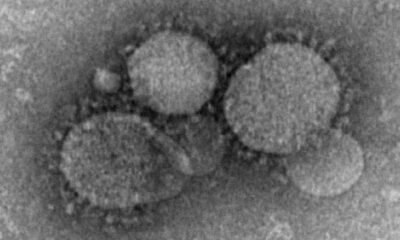World
Saudi Arabia reports 4 new cases of MERS coronavirus

Saudi Arabia has reported four new cases of Middle East respiratory syndrome (MERS), a coronavirus which first emerged about 12 years ago, according to health officials. Two of them were caused by human-to-human transmission.
According to a statement from the World Health Organization on Thursday, three of the cases were found in Riyadh between April 10 and April 17. The index case, a 56-year-old school teacher, had no clear history of exposure to MERS risk factors.
The teacher first developed symptoms – including a fever, cough, a runny nose and body aches – on March 29. He went to the emergency room of a local hospital on April 4 and was taken to the ICU on April 6, where he died the following day.
“The case had underlying health conditions, including hypertension and chronic renal failure requiring hemodialysis,” WHO said. He had no recent history of exposure to camels, which are the natural host of MERS coronavirus.
After the man’s test results came back, investigators tested dozens of people and found two more cases among patients at the hospital, including a 60-year-old man who shared a room with the teacher on April 4. He developed a fever two days later and was subsequently admitted to the ICU.
The third case, also a 60-year-old man, went to the emergency room on the same day as the index case, though he was ultimately admitted to a different room. He developed shortness of breath on April 10 and was transferred to the ICU on April 15, after which he tested positive for MERS.
Both the second and third case were still in the ICU in late April, according to WHO‘s report. Their current condition has not been released.
Saudi Arabia also disclosed another case in the city of Taif, about 457 miles (736 kilometers) southwest of Riyadh. The fourth case, a 32-year-old man, had recent contact with camels and passed away on February 17.
MERS coronavirus emerged in the Middle East in 2012 and has so far infected 2,613 people in 27 countries, including 941 people who died. There’s no vaccine or treatment for MERS although several vaccines and therapeutics are currently in development. Treatment is supportive and based on the patient’s symptoms.
Cases of the deadly virus have been relatively low in recent years with only 5 cases reported in Saudi Arabia in 2023 and 5 more in 2022. The largest outbreak happened a decade ago, in 2014, when 663 people were infected in Saudi Arabia, where more than 80% of global cases have been found.
Humans are typically infected from direct or indirect contact with dromedary camels, which are the natural host of the MERS coronavirus. There have also been confirmed cases of human-to-human transmission but most of them were limited to health care settings or close contacts.
While some researchers have expressed concern about the possibility of increased human-to-human transmission, and potentially a pandemic, the World Health Organization assesses the overall risk of MERS to be “moderate” at both the regional and global levels.


-

 Health2 days ago
Health2 days agoFrance confirms 2 MERS coronavirus cases in returning travelers
-

 Health4 days ago
Health4 days ago8 kittens die of H5N1 bird flu in the Netherlands
-

 Legal1 week ago
Legal1 week agoUtah Amber Alert: Jessika Francisco abducted by sex offender in Ogden
-

 US News1 week ago
US News1 week agoExplosion destroys home in Oakland, Maine; at least 1 injured
-

 Health1 week ago
Health1 week agoMexico’s September human bird flu case confirmed as H5N2
-

 Legal5 days ago
Legal5 days ago15 people shot, 4 killed, at birthday party in Stockton, California
-

 US News4 days ago
US News4 days agoFire breaks out at Raleigh Convention Center in North Carolina
-

 World1 week ago
World1 week agoWoman killed, man seriously injured in shark attack on Australia’s NSW coast




